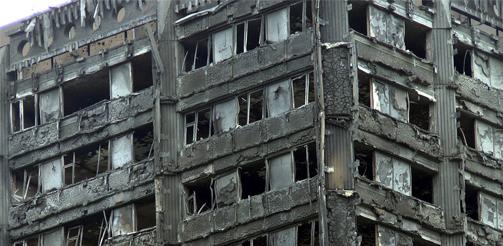The global economy is not only complex, it is brutal. With just 600 cities accounting for the majority of global GDP, people are arguing that it is not nation states, but ‘global cities’ driving the world economy. However, to enable this city-centric view, the world economy has become remarkably exclusionary, with devastating consequences even for those who think they are not vulnerable. The fire at Grenfell Tower in London brings home the deep inequalities and class struggle that underwrite the global housing crisis.

The UN’s special rapporteur on the right to housing, Leilani Farha, recently pointed out that ‘the world’s money markets have priced people out of cities, with speculators treating housing as a place to park capital’. What’s worse, is that the structure of land and property markets are such that they reward and reinforce this behaviour. There is constant pressure on local, municipal and building regulations to ease up to make way for investor friendly cities.
At the same time, popular opinion is swayed by a coarse weighing-up between social housing on the one hand, and wealth generation on the other. Lest we forget, the former is a basic human right, while the latter is something we should all have a stake in. In the case of the Grenfell Tower tragedy, it is suspected (but as yet unconfirmed) that cheaper cladding material used, and a disregard of fire safety regulations may have been responsible for the rapid spread of the fire. The tower stands in Kensington and Chelsea, one of the most affluent boroughs in London (and the country), and the victims who were from refugee, working class and ethnic minority backgrounds, lived right next to millionaires and billionaires.
Renowned economist, Thomas Piketty has shown us that inequality makes us all worse off. And yet, as Saskia Sassen points out in her new book titled ‘Expulsion’, the new global market for land, and the triumph of finance capital, continues to displace a dramatically increased number of people. This has lead to a rise in homelessness due to foreclosures and underemployment, and causing the criminalisation or incarceration of people as a form of social control. One in four people are worried about losing their home against their will in the next five yearsrevealed in a survey of nine countries. Simply put: people are being expelled at historically remarkable levels, not only from their habitats, but also from the benefits of the global economic system.
The poorest and most marginalised urban residents in the cities of the global South, who live in squatter settlements and in constant fear of their home and their bodies being subjected to the violence of eviction (like the recent fires and brutal eviction in the Otodo Gbame informal settlement in Lagos, Nigeria), find themselves both in the crosshairs of the legal instruments used to formalise urban space, as well as at the mercy of local gangs and non-state security providers who are often deployed to carry out evictions on the state’s behalf. The actors may be different in the cities of the global North, but the process by which global capital trumps local regulation while the under classes are persecuted, is the same.
In the UK, Margaret Thatcher introduced the right to buy in the 1980s. But, as a recent Guardian article points out, houses sold off under the right to buy legislation were ‘not matched by replacement building of affordable and social housing. Shelter revealed in 2015 that a third of councils in England had not replaced a single home sold through the right to buy scheme since 2012, and in March this year it was revealed councils have been forced to pay more than £800m from right-to-buy sales to the Treasury over the past five years – money that could have been used to build more than 12,000 additional council properties.’ Reportedly, the Kensington and Chelsea council has built just ten new social homes in the last 28 years.
We must ask why some of us have safety nets, while others fall through. Why do a very small number of us benefit from the markets for land and property, while the vast majority are at a constant risk of being decimated by the vicissitudes of global financial flows that we have no control over. One way to start answering these questions is to train our sights on local and municipal regulations. We need to ensure these do not perpetuate global inequality locally. We need to ensure that our attempts at generating wealth also champion our basic human rights at the local level.
In Lagos, the community has had to vocalise their demands for equal rights through public protests. In London, the residents of Grenfell Tower tried to repeatedly raise their concerns about dangerous living conditions. Their complaints appear to have fallen on deaf ears and many are calling the tragic fire on 14 June a man-made disaster. The fire-fighters, rescue workers and community volunteers were the heroes on the night; but who will douse the fire of inequality that rages on?
